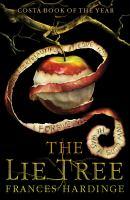
What had she just done? She had obediently opened a door and stepped through into blackness, without even knowing if there was a floor on the other side.
Why, oh why, haven't I read more books by Frances Hardinge? I loved the first book of hers I read years ago, thoroughly enjoyed another, and have seen how well reviewed everything she writes is. Now this one has convinced me I simply must find a way to read them all.
In spite of everything, there was real pleasure in the thought of her lie sending tremors through Vane, knocking her enemies off balance. She was filled with pride and a sense of power. She was good at this . . . and getting better.
The title seems a bit innocuous, as it's hard to think of a tree as all that ominous or menacing. But it is. The tree's power is dark, seductive, and dangerous. It lures with promises of beneficence that lead to enmeshing webs of lies and secrets and malevolence.
Her self-respect had suffered a head-on collision with love, a clash that generally only ends one way. Love does not fight fair. In that moment her pride, the gut knowledge that she was right, even her sense of who she was, meant nothing, faced as she was with the prospect of being unloved.
At the start of her story, Faith knows nothing of the tree. Or of lies. Her father is a respected reverend and famous naturalist. She is the good daughter, following him, with the rest of her family, to a temporary home on an island so he can take part in a new archaeological dig. She has her role to play to help them maintain their proper place in respected society and make a good impression in their new community.
"The larger the skull, the larger the brain, and the greater the intelligence," the doctor continued, warming to his theme. "You need only look at the difference between the skull sizes of men and women. The male skull is larger, showing it to be the throne of intellect." The doctor seemed to become aware that he was not being entirely tactful. "The female mind is a different thing altogether," he added quickly, "and quite delightful in its own right! But too much intellect would spoil and flatten it, like a rock in a souffle."
She lives in interesting times. Darwin has just published his famous book and science is entering a new era, casting old beliefs in a new light. Rationalism reigns supreme, with its mantra that everything will eventually be explained and understood with enough scientific study.
"A girl cannot be brave, or clever, or skilled as a boy can. If she is not good, she is nothing."
Even so, not all of the old beliefs have been reversed. Faith has devoured her father's library, taught herself Greek and Latin, is current on the latest science, and is ever so clever. Except that she is not allowed to be. She must keep that side of herself hidden, private. She must, by the very nature of society, be a liar.
Back in the trophy room the gentlemen would be taking the leash off their conversation. Likewise, here in the drawing room, each lady quietly relaxed and became more real, expanding into the space left by the men. Without visibly changing, they unfolded, like flowers, or knives.
So, in some ways, she is unprepared when cracks start showing in her father's carefully tended persona. She is astounded to learn he has some dark secrets of his own, has spun a web of lies that has become his undoing. In other ways, though, she is more than prepared to inherit his lie tree, to use it to investigate the mystery of his death and improve her family's circumstances.
But will she succeed where he failed? And at what cost?
People were animals, and animals were nothing but teeth. You bit first, and you bit often. That was the only way to survive.
Hardinge has crafted a wonderfully complex tale with a wonderfully complex heroine. A rationalist mystery with just enough supernatural to give it an even creepier edge. Told with beautiful, eloquent language . . .
The cave smelled of the sea, but it was not a cheerful seaside smell. It reeked, as if the sea were something old and evil. This sea licked the flesh off shipwrecks, leaving the bare wooden bones in the lightless deep. Its mermaids were green-skinned and squid-eyed with long, hooked fingers and breath that smelled of old fish.
and delightfully quotable insights.
